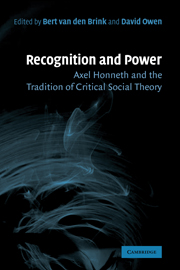Book contents
- Frontmatter
- Contents
- List of Figures and Tables
- Contributors
- Acknowledgments
- 1 Introduction
- PART I PHILOSOPHICAL APPROACHES TO RECOGNITION
- PART II RECOGNITION AND POWER IN SOCIAL THEORY
- 6 Work, Recognition, Emancipation
- 7 “… That All Members Should be Loved in the Same Way …”
- 8 Recognition of Love's Labor: Considering Axel Honneth's Feminism
- PART III RECOGNITION AND POWER IN POLITICAL THEORY
- PART IV AXEL HONNETH ON RECOGNITION AND POWER
- Bibliography
- Index
6 - Work, Recognition, Emancipation
Published online by Cambridge University Press: 24 July 2009
- Frontmatter
- Contents
- List of Figures and Tables
- Contributors
- Acknowledgments
- 1 Introduction
- PART I PHILOSOPHICAL APPROACHES TO RECOGNITION
- PART II RECOGNITION AND POWER IN SOCIAL THEORY
- 6 Work, Recognition, Emancipation
- 7 “… That All Members Should be Loved in the Same Way …”
- 8 Recognition of Love's Labor: Considering Axel Honneth's Feminism
- PART III RECOGNITION AND POWER IN POLITICAL THEORY
- PART IV AXEL HONNETH ON RECOGNITION AND POWER
- Bibliography
- Index
Summary
The recognition paradigm plays an important role in current philosophical social criticism. It has dominated the sociocritical landscape ever since the communication theory paradigm of the conflicts between system and life world vanished without much ado – for reasons awaiting closer interpretation – from the scene of theoretical discourse. For the paradigm of recognition, social criticism rests on a normative conception of the intersubjective formation of successful individual identities in concrete social contexts. From the outset, the concept of recognition, as a moral concept, aims to forge a link between the perspectives of social theory and a theoretical understanding of successful identity development. Social conflicts and struggles must be interpreted as conflicts in the struggle for recognition; social pathologies have to be understood as arising from the lack or denial of social recognition. The most articulate representative of this theory of recognition is certainly Axel Honneth.
In this chapter, I want to analyze the theory of recognition from a very specific perspective: the perspective of labour. Thus, I will ask what the sociocritical paradigm of recognition contributes to the empirical and normative problems connected with the transformation of the “labour society.” What interests me in particular is the way in which the theory of recognition stakes a position on the traditional issue of the lack of social recognition afforded to domestic family work, and how it criticizes the de facto power relations expressed in the gender-specific division of labour.
- Type
- Chapter
- Information
- Recognition and PowerAxel Honneth and the Tradition of Critical Social Theory, pp. 135 - 163Publisher: Cambridge University PressPrint publication year: 2007
- 16
- Cited by



